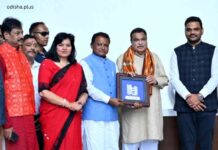Bhaskar Parichha

Kaushik Basu was chief economic adviser (CEA) to the Indian government from 2009 to 12. Thereafter, he served as chief economist of the World Bank till 2016. During these years, Basu kept a journal to record his observations and experiences which have now been published.
‘Policymaker’s Journal: From New Delhi to Washington DC’ (Simon & Schuster/ New Delhi) is gorgeous and fascinating. Basu is professor of Economics and Carl Marks Professor of International Studies at Cornell University. He is currently serving as president of the International Economic Association.
The book records the course of his career over seven years. Encounters with expected and unexpected world leaders and influencers—Manmohan Singh, Narendra Modi, Barack Obama, Sheik Hasina, Deepika Padukone and many, many others—pepper and liven this charming page-turner of a journal. Basu’s Indian years were a period of high inflation, growth challenges (as the global financial crisis arrived in India) and also a remarkable growth recovery story, with India moving past China’s GDP growth rate. There were corruption scandals causing widespread street protests, plenty of late-night decision-making which one knew would rock the stock market the next day and getting to know politicians who were outstanding as statesmen amid all this, as well as many who were not.

So, what was the view from the inside? How and why did the UPA allow such a fast slide, more so on the economic front, and especially since it was being led by a top economist?
Writes Basu : ‘5 February 2011, Saturday.‘The Prime Minister’s office calls when I am bathing. On the way to the airport to catch the Mumbai flight, I call back. I am told the prime minister is coming on the line to speak to me. The roar of traffic outside is deafening. I tell my driver, Manbir, to roll up the window. The prime minister quickly gets to the point. He says while India’s black money problem is serious, most people, including politicians, misunderstand what creates black money and the hazards and challenges of controlling black money. It needs to be curbed but done wrong can backfire and hurt ordinary people. He rightly anticipated that I would agree with this and so decided to call me. He asked me (casually, I think) if I could write up something that he can use in parliament should the opportunity arise. He thanked me for my letter to him from the previous week—the letter that I sent him with some inputs for the president’s speech to the parliament at the start of the budget.’ The World Bank years ranged from interacting with officials in tiny, remote countries like Samoa, to gigantic nations with considerable heft, such as China. It entailed sitting down with leading researchers to compute and announce global numbers on extreme poverty and rankings on how easy it is to do business in different countries and assisting quarreling nations to communicate amicably and coordinate on policy.

Basu narrates these momentous periods in his diplomatic career with a rare lightheartedness which not only informs by giving the readers a ringside view of Indian bureaucracy. The entries in the journal are often funny or illuminating or both. For example, in one entry, he records a common power play to raise the height of adjustable chairs – presumably to gain some advantage – in political meetings, even if it leaves one’s legs dangling.
The first half of the book, dealing with when Basu was the chief economic adviser, is the really interesting part. The period between 2009 and 2012 was quite a remarkable one for India. On the economic front, 2009 became a watershed year as India started losing its fast growth momentum, and, by 2012, the economy had completely run out of steam. Investments by businesses have not recovered since, even as all other metrics such as individual consumption, exports, the health of the banking system, employment levels, etc. have also petered out. The United Progressive Alliance UPA) II was characterized by decelerating growth and speeding up prices.

This entry from October 15, 2011, recounting PM Singh’s meeting on inflation with D Subbarao (then RBI governor), Saumitra Chaudhuri (from former Planning Commission member), C Rangarajan (then chairman of the PM’s Economic Advisory Council), Montek Singh Ahluwalia (then deputy chairman of the Planning Commission) is engrossing. “The quality of the discussion was first rate. It is not difficult to see why through all the ups and downs, India’s economy has, overall, done so well in recent times.”
Being essentially a collection of diary entries, Basu’s book is neither intended to address any direct query nor does it provide a clear, compact answer. But reading it will reintroduce many to the not-so-vague helplessness that abounded policy making in that era.
Basu also gives us interesting incidents from his personal life and doesn’t shy away from sharing the cheeky bits — like when he stole a menu card for a dinner that the PM hosted to honor Venkatraman Ramakrishnan winning the Nobel Prize for Chemistry or the time when he almost joked that he always thought Mangalore was a spelling mistake!
What makes this a must-read is the way Basu fills each page with fascinating insights from economics, politics, diplomacy and society .
(The author is a Bhubaneswar based senior journalist and columnist. Views are personal)






















